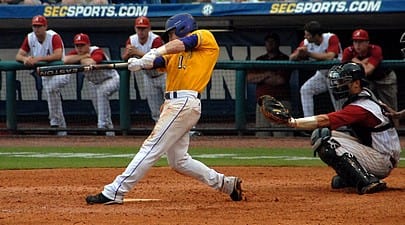Regional Reaction: Finding the Zone

Selection Committees are like umpires, all we can ask for is consistency. Call the high strike? OK, Good to know. I'll be ready to cut at it.
With our Regional field it seems every year has its theme. Some years the field favors teams with sparkling RPI rankings. Other years specific parts of the country gain favor. Some times we have teams from the bottom of the conference sneak their way in. This year, our prevailing wind is a shift towards conference finish season and away from RPI.
Advertisement
"We try hard not to box ourselves into, okay - 'this is what we did last year' - so we've got to do it again this year," NCAA Selection Committee Chairman Tim Weiser said. "I think each team is different, each year is different and you kind of have to set aside what you've done in the past and not let it bias you as you go forward."
Interesting concept. Kind of makes it hard to adjust though. It is like finding out the strike zone after the at bat. Now you just learned those high pitches that were balls last year are now strikes and you just struck out. Unlike a game where you can adjust on the fly, this judgment is performed after the bat is put back in the rack.
Good RPI clubs like LSU (#26), East Tennessee State (#33), and Ole Miss (#39) were left out while St. John's (#54) and Troy (#50) are in. Arkansas (#14), Stanford (#15), and Miami (#16) will not host while TCU (#19), Oregon State (#31), and UCLA (#33) will.
"If it was simply a matter of RPI, we would not need to spend our Memorial Day weekend doing this," added Weiser. "We could just roll down the list."
At the top of the field UCLA received a host as a #1 seed despite an RPI rank of 33. They won the Pac 10. All of the hosts were #1 seeds.
"I think when you have a conference championship in the conference like the Pac 10 that is deserving of a lot of discussion," said Weiser. "Back to our committee deliberations, the fact that they were Pac 10 Champs was a very valuable thing."
At the bottom of the field, St. John's was the biggest shocker which was justified by their second place finish in the Big East.
"St. John's finished second to what we considered to be a very good Connecticut team and finished second in their conference tournament," Weiser explained. "In the end, what that discussion centered on for a number of our committee members is that a second place finish in the Big East (13th rated conference) was more important than a ninth place finish in the (top-rated) SEC. In these committees, it depends on your perspective as to how you answer that. We had a lively debate about it. In the end we got the seven votes done by blind ballot and that put (St. John's) in the field."
Meanwhile teams that finished lower in the SEC did not fare well. Arkansas, 15-15 in SEC, did not host despite a #13 RPI. LSU, 13-17 in the SEC, missed out on the field altogether.
We had LSU in the field with St. John's out. As is the case at the end of the at large pool each year, there are more reasons to keep both teams out than in.
St. John's won just one game against a top 50 RPI team. That came as they took one of three in a series loss at Georgia Tech. They were 1-6 against the top 50 and 9-16 against the top 100. They did finish second in the Big East, a three-bid conference whose average RPI rank is 127.
LSU was ninth in the SEC and a 7-11 road record with 15 of those road games in conference play. Non-conference road games against Nicholls State, New Orleans, and Tulane apparently were not a large enough sample size for the committee.
"In the end, we were faced with a non-conference schedule that didn't provide for many road games," Weiser said on the Selection Show. "So when we don't have the information from a non-conference schedule, even though they played a Cal State Fullerton. The fact that we didn't have many road games as a committee we had to go back to the conference results. We didn't think that was strong enough to warrant a selection this year."
Weiser's comment should be printed out and put on the office wall of every schedule maker in college baseball. Play good people on the road and you will be rewarded (at least with this strike zone - or should we say this committee).
Ironically, LSU's last impression for the committee was a road series win at Mississippi State - a team that finished one game ahead in the standings and saw their name called today with a trip to Atlanta. That Friday meltdown where the Tigers blew a 5-0 lead capped with two MSU runs in the ninth will be remembered by both fan bases. That outcome effectively provided the difference in both of their postseason futures. If LSU holds the lead, all signs point to the Tigers are in and the Bulldogs are out.
All in all, the committee did a solid job. The St. John's inclusion was a head scratcher, but with their Athletics Director on the committee they obviously had sufficient representation.
"I think our committee did a better job of putting the RPI where it should be as a single tool to evaluate," Weiser said. "Often, that becomes bigger than it really should be. As a committee, we probably did not use the RPI as the hammer that it has been perceived to be in recent years."
No complaints here. Just try to keep that strike zone where it is. If we can find it, we'll adjust to it.